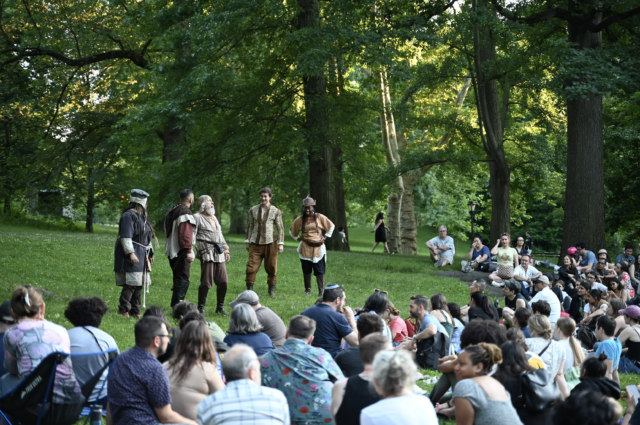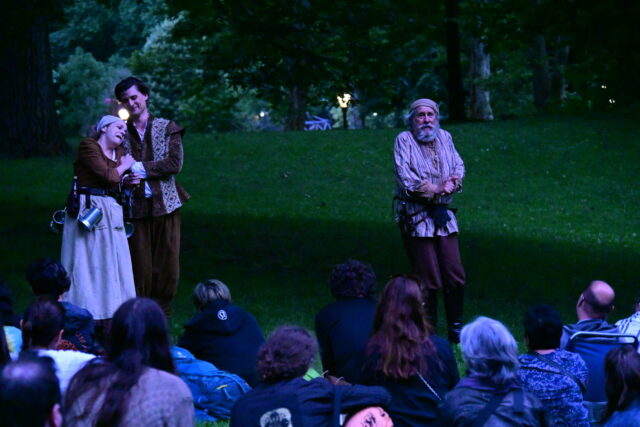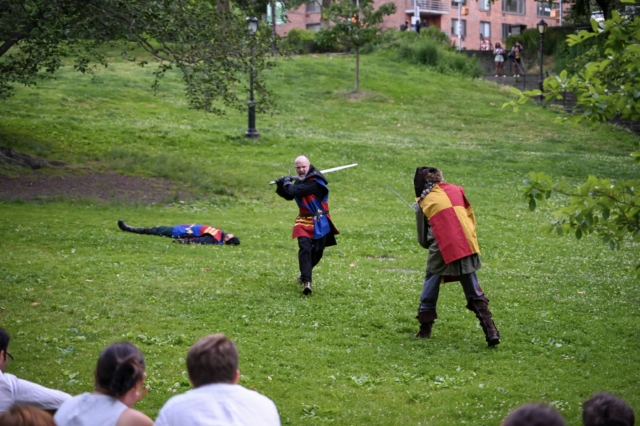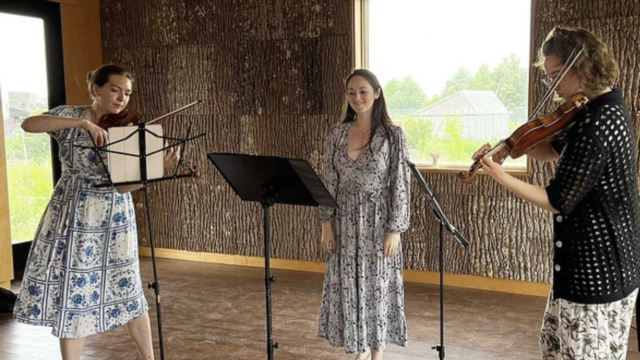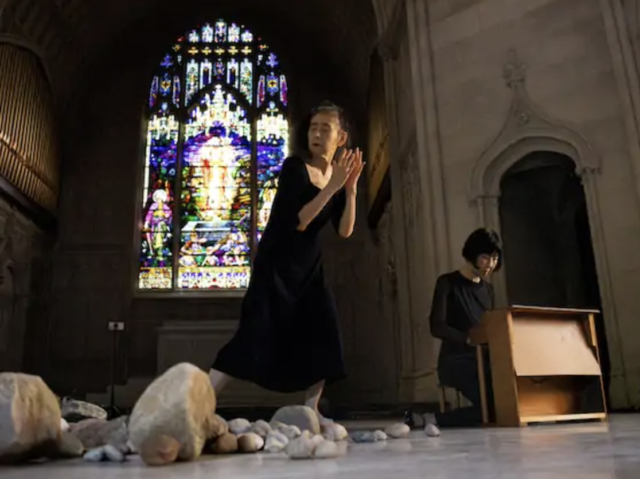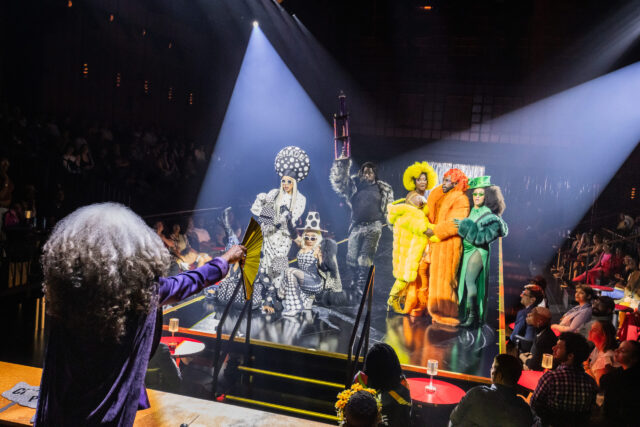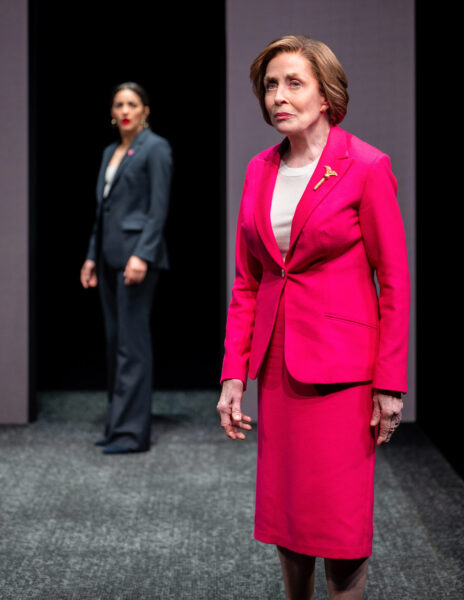
Ana Villafañe and Holland Taylor portray familiar but unnamed characters in Mario Correa’s N/A (photo by Daniel Rader)
N/A
Mitzi E. Newhouse Theater
150 West 65th St. between Broadway & Amsterdam Ave.
Tuesday – Sunday through September 1, $72-$200
www.lct.org
natheplay.com
Holland Taylor for president!
On June 27, I saw Mario Correa’s potent N/A, making its world premiere at the Mitzi E. Newhouse Theater at Lincoln Center through August 4. The eighty-minute play is a series of fictionalized conversations, based on actual text and dialogue, between two unnamed but obvious political figures: two-time Speaker of the House Nancy Pelosi, splendidly portrayed by Taylor, and Alexandria Ocasio-Cortez, fully embodied by Ana Villafañe.
When I got home, I watched the debacle of a debate between former president Donald J. Trump and the incumbent, Joseph R. Biden. Afterward, I decided to cast my vote for Taylor.
N/A begins with A, having just won the Democratic primary for a House seat representing parts of Queens and her home borough, the Bronx, livestreaming from the office of the minority leader, N. Referring to her opponent as “a total corporate shill,” she says, “So you look in the mirror and you say to yourself, be the change you wanna see in the world, right? Also, fuck those motherfuckers!”
N then enters the room and asks if she’s interrupting.
“Where did you come from?” a shocked A says. “Baltimore. Where did you come from?” N responds seriously. “Were you there the whole time?” A wants to know. N replies, “In my office, you mean?”
Thus, the generational battle lines are immediately drawn, the old guard against the new. Over several talks, N explains how things happen in the House, that it’s not so simple to get a bill passed there, then in the Senate, and finally signed into law by the president. A Baltimore native, she is a pragmatist with decades of experience — she was first elected to serve in the House in 1987, two years before A was born, and became the first woman Speaker in 2007.
The newly elected A wants to effect change instantly, ready to implement her Green New Deal, end the militarization of the border, provide affordable, universal health care and free college tuition, and other plans. When A says that N is “on record against most of this agenda,” N answers, “Agenda? That’s an Amazon wish list. Load it up!”
N also points out that her favorite number is 218 — the number of Democrats needed to have a majority in the House. She states that without that, they essentially cannot get anything done, no matter now necessary it appears. Many of their discussions follow this kind of trajectory:
N: I’m going to say something to you, and I don’t want you to take it the wrong way. This isn’t college. I’m not Plato, you’re not Aristotle, and we’re not here to contemplate the Republic. We have real work to do, urgent work — right now. You can be a part of it.
A: We should contemplate the state of the Republic. It’s dire.
N: And I’m happy to do that. After we win back the House.
A: Our country’s problems are systemic. Not by accident — by design. Foundational inequities built into the organizing principles of this nation. And until we reckon with them head-on, it doesn’t matter how many elections we win. We will never fill a leaky bucket.
N: And yet that is our work, for it’s the only bucket we’ve got.
A: Or . . . we get a new bucket.
What becomes clear as they continue to hold these mini-debates is that their goals are not very different; what separates them is the method of getting there.
N: We have much in common, you and I . . . Relentless, persistent, dissatisfied. That is our nature; we are outsiders —
A: You’re an “outsider”?
N: If the Framers walked through that door right now and saw me sitting here, how happy do you think they’d be?
A: A lot happier than if they saw me.
N: Nah. They’d see a woman and keel over. That’s it.
A: Well . . . A white woman of wealth. With a few smelling salts, I bet they’d come around.
N: And soon, they’d learn she didn’t come from wealth.
A: But then they’d remember that she came from whiteness.
N: And then someone would remind them of the concept of a wop. A dago.
A: And someone else would inform them that this lady’s father had been a Member of Congress.
N: To which one of them would undoubtedly ask, “What does that matter?”
A: To which another would answer, “The most common route to privilege in this country is generational transfer.”
Ultimately, N tells A that the key is, “Know your friends. Know your enemies. Know the difference,” whereas A’s motto is “Más que menos . . . Literally, ‘more than less.’ In essence . . . ‘Leave it better than you found it.’”
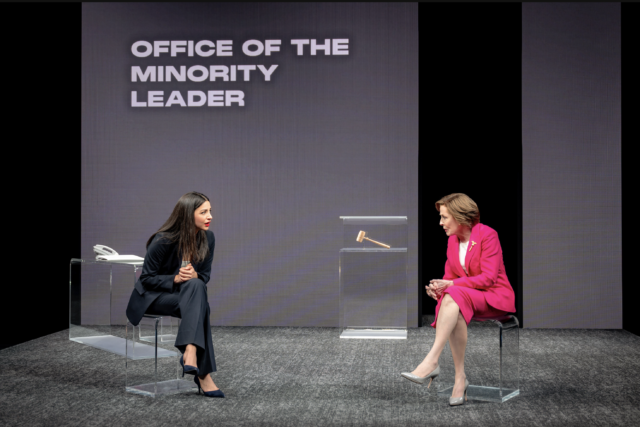
Alexandria Ocasio-Cortez (Ana Villafañe) and Nancy Pelosi (Holland Taylor) get down to business in world premiere play (photo by Daniel Rader)
In addition to “N/A” referring to Nancy Pelosi and Alexandria Ocasio-Cortez, it can mean “not applicable,” “not available,” “no account,” and “no answer,” all of which relate to Correa’s well-written play, astutely directed by Tony winner Diane Paulus (Little Jagged Pill, The Gershwins’ Porgy and Bess), who is a much better “moderator” than most debate hosts, allowing each side to speak their peace and support their claims.
Myung Hee Cho’s set features Lucite furniture, including a case with a Speaker’s gavel in it, echoing A’s declaration that public officials must be transparent; meanwhile, Cho’s costumes capture the characters to a T, N in a white blouse, buttoned pink jacket and knee-length skirt, and high heels, A in a white shirt, unbuttoned black jacket, black pants, and black flats that later become heels. Possible and Lisa Renkel’s red, white, and blue projections focus on the evolving makeup of the House as it shifts between Democratic and Republican control. Mextly Couzin’s lighting effectively indicates the passage of time between scenes, although the interstitial music is cloying. (The sound design is by Sun Hee Kil and Germán Martínez.)
Villafañe (On Your Feet, Collective Rage: A Play in 5 Betties), who is the same age as AOC, more than holds her own with Taylor, capturing her character’s determination, aggressiveness, and refusal to compromise. Villafañe stands tall as AOC is not afraid to hit back and say what’s on her mind.
But Taylor shines as Pelosi; it’s as if she has a glow as she tries to educate the younger congresswoman in the ways of politics, and the world itself. She exhibits Pelosi’s confidence, intelligence, and understanding of the tactics of negotiation in her every movement.
Pelosi might have stepped down from her position as minority leader in January 2023, but, at the age of eighty-four, she is still ably representing her California district. Philly native Taylor (The Morning Show, Two and a Half Men), at eighty-one — born two months after President Biden — is still at the top of her game, regularly appearing onstage, on film, and on television. I have no doubt that she could stand behind a podium and lay any political opponent to waste; she certainly has my vote.
In 2013, Taylor starred as Texas governor Ann Richards in her one-woman show Ann at Lincoln Center’s Vivian Beaumont Theater. When Taylor-as-Richards stood at the podium, discussing her battle with cancer and her hope for the future of America, it was easy to see why Richards was considered a possible vice presidential running mate for John Kerry — or a presidential candidate herself.
In 2015, Taylor put on the boxing gloves in Pulitzer Prize winner David Lindsay-Abaire’s Ripcord at City Center, a hilarious battle of wits between two elderly roommates in a suburban New Jersey nursing home. Abby Binder (Taylor) is a nasty, mean-spirited, and spiteful woman filled with vitriol that she pours on everyone and everything, while Marilyn Dunne (Marylouise Burke) is a kind, sweet-natured soul who loves life and wants only happiness for all.
Sound familiar?
[Mark Rifkin is a Brooklyn-born, Manhattan-based writer and editor; you can follow him on Substack here.]


